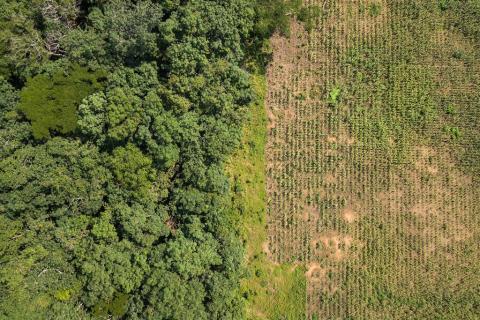Discover hidden stories and unheard voices on land governance issues from around the world. This is where the Land Portal community shares activities, experiences, challenges and successes.
 Follow our
Follow our
Sustainable Development Goals
Blog Series!
Interested in land corruption?
Follow our Land & Corruption Blog Series
for in-depth perspectives from the experts.
Issues
Geographical focus
Photo: Kandukuru Nagarjun, via Flickr, CC BY 2.0
The recent series of ALIGN articles shed light on how civil society, impacted communities and rights defenders across the world have used strategies such as legal action, publishing of mining contracts and stakeholder dialogues to change approaches to land-based investment governance.
Members of the House of Chiefs discussing Zambia's National Land Policy at a meeting organised by Zambia Land Alliance (Photo: Jesinta Kunda, ZLA)
In a blog series from IIED and the Land Portal, rights defenders and practitioners in the global South reflect on their strategies to push for more responsible and sustainable land-based investments. Here, guest blogger Jesinta Kunda describes how civil society organizations were key to improving Zambia’s first ever National Lands Policy.
Overcoming Land Disputes by Fostering Relationships in Communities: Experiences from Zambia’s Systematic Land Titling Program
Written by Dimuna Phiri and Kamiji Malasha
Unresolved disputes and disorder, can be addressed through the judicial system. However, the process is expensive, slow, unscalable, and does not focus on reconciling individuals, families and communities. Through the lens of beneficiaries, this article reveals the importance of alternative dispute resolution in land reforms, particularly adjudication committees.
Just like many African countries, a majority of Zambian tribes follow a matrilineal system, that is, an affinity system in which descent is derived through maternal instead of paternal lines which essentially means children are recognised by the names or family of their mothers. This does not only affect decent but also involves the inheritance of titles and property including land through the female line. One might ask why women have less access and control of land in Zambia when land and property is inherited through maternal lines.
In many countries men control who gets to use, own, and make decisions about land.
“We used to stay in a corner, quiet. If someone came to take our land or exploit our forests, we did not have the courage to try to stop them.” These words from a woman in Mecoburi, Mozambique reflect how women across the world often feel powerless to defend their rights to land and natural resources. For rural communities, land means everything, from the ability to produce crops for food and income to leveraging financial assets.
Gender equality guidelines will motivate Zambia’s traditional leaders to champion women’s rights in land and resource management
In the second PhD session of the LANDac Conference 2021, three PhD researchers presented their work in progress. We learned about slums in Abuja, Nigeria, about forest rights in India, and about the relation between inequalities in soil fertility, gender, and access to subsidies. Each presentation was discussed by an expert from the LANDac network.
Key Takeaways
The session addressed the impacts of land-based investments on poor and vulnerable people in the Global South. It facilitated an exchange of knowledge about the strategies that are employed on the ground to strengthen the position of these groups when it comes to negotiating for their interests with investors amidst the climate crisis and the global pandemic. How might we, as practitioners, researchers and policymakers contribute to increased developmental impact of land-based investments, especially in times of crisis?
Across much of Africa, land is not allocated and inherited under statutory law but through customary practices rooted in kinship. In patrilineal systems, land belongs to men’s families and is inherited through the paternal line.
In Zambia, many ethnic groups follow a matrilineal system, where women own land and pass it down the maternal line.






